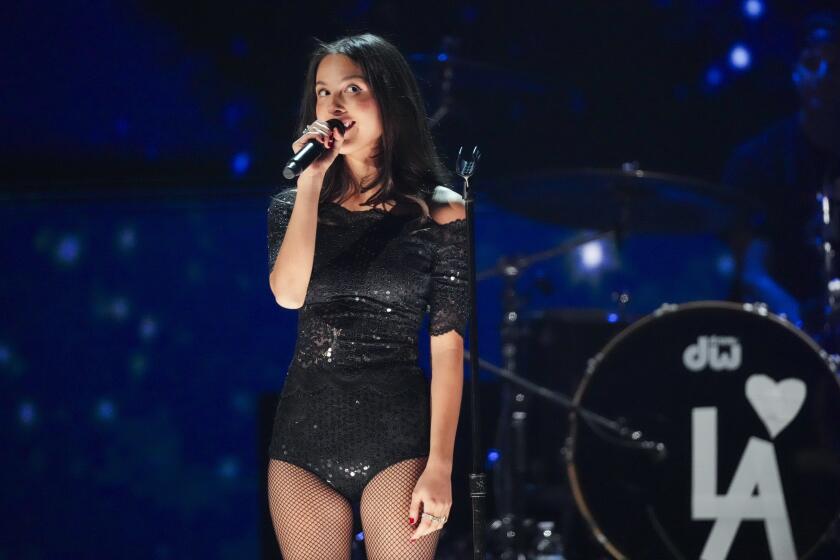THE MARRIAGE OF MUSIC AND MOVIES
- Share via
Mark Swed refers to Bernard Herrmann, Alex North and David Raksin as part of “a new generation of talented and sophisticated American composers” discovered, cinematically, “by the ‘50s and ‘60s” (“They Shoot, They Score,” July 27).
While his reference is not wholly inaccurate (North’s first principal film score was “A Streetcar Named Desire,” released in 1951), Herrmann’s major contributions to film was established in the 1940s with such scores as “Citizen Kane,” “The Magnificent Ambersons” and “The Ghost and Mrs. Muir.”
Raksin’s career in film music began in 1935 when he co-composed (with Charlie Chaplin) the score for “Modern Times.” He wrote numerous scores throughout the late ‘30s and ‘40s, among them “Laura,” “Forever Amber” and “Force of Evil.”
Incidentally, on Monday, Raksin will be 85 years young. He remains active in film, television and concert music as a composer, conductor, orchestrator and educator. He is currently writing his autobiography.
MARILEE BRADFORD
Los Angeles
Bradford is a film music preservationist and album producer.
*
As the daughter of a studio musician and the niece of the late Victor Young, renowned for his movie music, I remember his music for the epic Howard Hughes film “The Outlaw,” starring Jane Russell and Jack Beutel. The music is pure Romantic Russian classics through and through, and I even believe that the credits read so.
I was a kid, not even 10, when I snuck into the Music Hall Theater in Beverly Hills, and heard those glorious themes. I recognized them immediately and knew that my Uncle Victor didn’t write that! Also, Dimitri Tiomkin was known for his use of classical themes in the movies he scored.
BOBBIE HILL FROMBERG
Van Nuys
*
I was disappointed that Swed did not mention two current sources for listening to this marvelous music besides movie theaters:
“Cinemascore,” featuring Ian Freebairn-Smith (a Grammy-winning arranger-composer), airs every Sunday from 5 to 6 p.m. on KKGO-FM (105.1).
“Music on My Mind,” Sundays from 6 to 7 p.m. on KKGO, features John Mauceri, famed conductor of the Hollywood Bowl Orchestra. He is one of the staunchest defenders of the rights of the Hollywood maestros’ place in the world of classical music. His favorite topic is the role classical music plays in films. He covers it often, with the same wit and daring charm that he displays in his performances at the Bowl.
MARY BETH GARBER
Calabasas
Garber is the general sales manager of KKGO-FM.
*
I believe the 1946 British film “Brief Encounter” (David Lean was Oscar-nominated for direction and screenplay) showed that the use of Rachmaninoff’s Second Piano Concerto as the main theme throughout contributed not only to audience appreciation but also to the tremendous record sales at that time and since.
JERRY PAM
Beverly Hills
*
To my knowledge, one of the first fully orchestrated film scores was composed by my father, Herbert Stothart. In 1928 he was asked by Arthur Hammerstein (Oscar II’s uncle) to compose the musical score, his first, for the 1926 Russian silent film “The End of St. Petersburg,” directed by Pudovkin.
He went on to compose more that 100 scores at MGM in the 1930s and ‘40s. He was nominated more than a dozen times for an Academy Award and won a 1939 Oscar for best original score for “The Wizard of Oz.”
Despite the often-repeated opinion that film scoring was invented by neo-Romantic European emigres, Stothart, who was born in Milwaukee, must certainly be considered one of the pioneers of motion picture scoring.
CONSTANCE STOTHART BONGI
La Jolla
*
As Swed notes, it’s long past time for the concert music world to shed its suspicion of movie music and its composers.
Among the first concert music composers to succeed in Hollywood was Leonard Rosenman. In 1953, Rosenman’s piano student, James Dean, brought Elia Kazan to a concert at Columbia University featuring music by Rosenman and Milton Babbitt. Afterward, Kazan insisted that Rosenman score “East of Eden.”
Rosenman, who along with Luciano Berio and George Rochberg was a Tanglewood fellow studying with serial music composer Luigi Dallapiccola in 1952, went on to compose Hollywood’s first 12-tone score, “The Cobweb” (1955). That year, he also scored “Rebel Without a Cause,” acknowledged by Leonard Bernstein as a major inspiration for “West Side Story.” And among his memorable film scores is the extremely avant-garde “Fantastic Voyage” (1966).
Last May, Rosenman’s Violin Concerto No. 2 was premiered by Elmar Oliveira with the American Composers Orchestra in Carnegie Hall and is scheduled for performance by Leonard Slatkin and the National Symphony next year.
JANE BROCKMAN
Santa Monica
*
Swed’s article was great, but featuring movie scores at the Hollywood Bowl and the Dorothy Chandler Pavilion is not enough. Today’s composers are not getting enough employment in films.
Too many of today’s “compilation scores” sound like FM radio air checks with music originally released as hit singles. The only missing element is the disc jockey!
RICK ROFMAN
Van Nuys
*
I’m appalled that Swed neglected to mention any of the numerous contributions of Danny Elfman. Elfman’s scores have brought life to a number of popular movies over the past 10-plus years (including “Edward Scissorhands,” “Batman,” “The Nightmare Before Christmas,” “Mars Attacks!” and “Men in Black,” not to mention the theme from TV’s “The Simpsons”) and he is recognized as one of the premier artists in his field. In addition, his roots in alternative music (with his now-dissolved band Oingo Boingo) have exposed many “twentysomethings” like myself to the beauty of classical music.
The opening sentence of Swed’s story stated, “We don’t go to the movies to listen to the music.” Danny Elfman fans are a small but dedicated group--and we beg to differ.
CHRISTOPHER A. THOMAS
Redlands
More to Read
The biggest entertainment stories
Get our big stories about Hollywood, film, television, music, arts, culture and more right in your inbox as soon as they publish.
You may occasionally receive promotional content from the Los Angeles Times.










